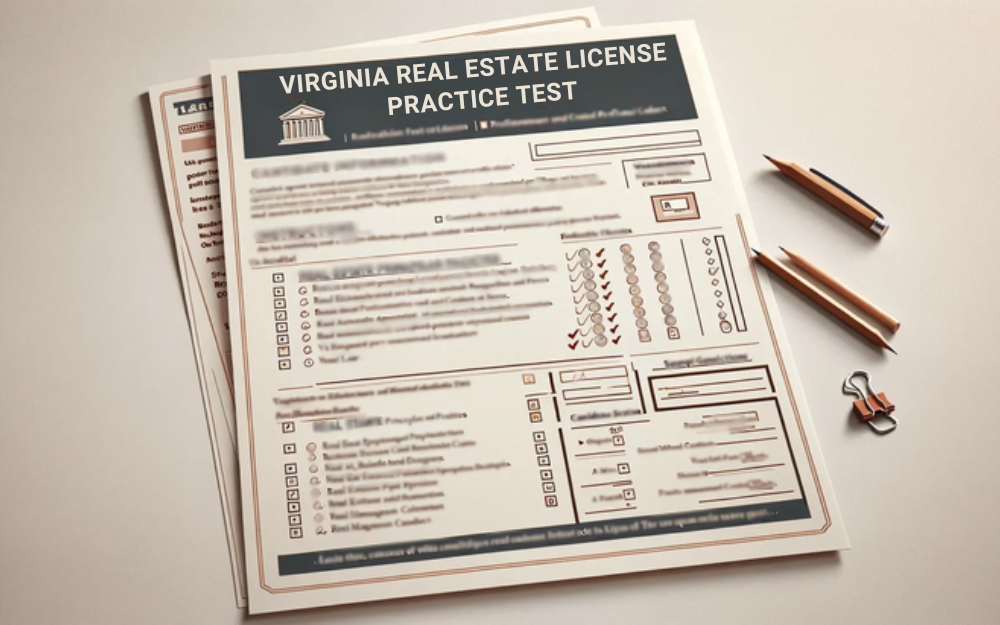
Determine your answer, then click the arrow to see the correct response.
What Is "Ad Valorem Tax"?
A) A tax based on the assessed value of an item such as real estate or personal property
B) A fixed tax amount regardless of property value
C) A tax that is only applicable to commercial properties
D) A tax levied on the income generated from property
Correct Answer: A) A tax based on the assessed value of an item such as real estate or personal property
Explanation: Ad valorem tax is based on the assessed value of an item, such as real estate or personal property. Property taxes are an example of ad valorem taxes.
What Does "Fair Housing" Refer to in Real Estate?
A) Policies that allow for flexible pricing of homes
B) Laws that prohibit discrimination in housing based on race, color, religion, sex, handicap, familial status, or national origin
C) Guidelines for energy-efficient home construction
D) Standards for the physical condition of rental properties
Correct Answer: B) Laws that prohibit discrimination in housing based on race, color, religion, sex, handicap, familial status, or national origin
Explanation: Fair housing laws are designed to prevent discrimination in the housing market, ensuring equal opportunity in housing for all people regardless of protected characteristics.
What Is a "Servient Tenement" in Real Estate?
A) A property that benefits from an easement
B) A property that is burdened by an easement
C) A property that is jointly owned
D) A property with multiple residential units
Correct Answer: B) A property that is burdened by an easement
Explanation: A servient tenement is a property that is subject to an easement, meaning it bears the burden of providing some form of benefit, such as access, to another property, known as the dominant tenement.
What Is "Title Abstract"?
A) A summary of all documents affecting the title of a property
B) The full legal description of a property
C) A certificate of title insurance
D) A deed transferring property ownership
Correct Answer: A) A summary of all documents affecting the title of a property
Explanation: A title abstract is a condensed history of the title to a particular piece of real estate, including summaries of all recorded documents affecting the property, such as deeds, mortgages, and easements.
Laura, a Property Owner in Virginia, Discovers That a Neighbor Has Built a Fence That Encroaches on Her Property. What Is Her Legal Recourse Under Virginia Law?
A) She must accept the encroachment
B) She can remove the fence without notice
C) She can request the neighbor to remove the fence or file a lawsuit for encroachment
D) She can charge the neighbor a fee for the encroachment
Correct Answer: C) She can request the neighbor to remove the fence or file a lawsuit for encroachment
Explanation: Under Virginia law, Laura has the right to request the removal of the encroaching fence or file a lawsuit to resolve the encroachment issue and seek damages if necessary (Virginia Code § 55.1-300).
Sarah, a Real Estate Agent in Virginia, Fails To Provide a Required Property Disclosure Statement to a Buyer Before the Purchase Contract Is Signed. What Rights Does the Buyer Have Under Virginia Law?
A) The buyer must proceed with the purchase without any recourse
B) The buyer can sue the seller for non-disclosure
C) The buyer has the right to terminate the contract and receive a refund of the earnest money
D) The buyer can demand a reduction in the purchase price
Correct Answer: C) The buyer has the right to terminate the contract and receive a refund of the earnest money
Explanation: Under Virginia Code § 55.1-702, buyers must be provided with a property disclosure statement before the contract is signed. Failure to provide this disclosure gives the buyer the right to terminate the contract and receive a refund of the earnest money.
What Is the Maximum Security Deposit That a Landlord in Virginia Can Require From a Tenant?
A) One month's rent
B) One and a half month's rent
C) Two months' rent
D) Three months' rent
Correct Answer: C) Two months’ rent
Explanation: According to Virginia Code § 55.1-1204, a landlord cannot demand or receive a security deposit in an amount or value in excess of two months’ periodic rent.
A Buyer in Virginia Purchases a Property Located in a Noise Zone With a Day-Night Average Sound Level of Less Than 65 Decibels. The Seller Failed To Provide the Required Disclosure Regarding the Noise Zone. What Is the Buyer's Recourse?
A) The buyer can terminate the contract without penalty
B) The buyer has no right to terminate the contract for this reason
C) The buyer can sue the seller for damages
D) The buyer can demand a reduction in the purchase price
Correct Answer: B) The buyer has no right to terminate the contract for this reason
Explanation: Virginia Code § 55-520 states that purchasers of residential real property in a noise zone with a day-night average sound level of less than 65 decibels do not have the right to terminate the contract if the disclosure is not provided.
A Property in Virginia Is Listed for $500,000. The Buyer Negotiates a 15% Discount on the Listed Price. What Is the Final Purchase Price After the Discount?
A) $425,000
B) $435,000
C) $440,000
D) $450,000
Correct Answer: A) $425,000
Explanation: A 15% discount on $500,000 is $500,000 × 0.15 = $75,000. The final purchase price after the discount is $500,000 – $75,000 = $425,000.
A Property in Virginia Is Sold for $650,000. The Seller Pays a 5% Commission to Their Real Estate Agent. How Much Does the Seller Net From the Sale After Paying the Commission?
A) $615,000
B) $617,500
C) $620,000
D) $622,500
Correct Answer: B) $617,500
Explanation: The commission paid to the real estate agent is 5% of $650,000, which is $32,500. Therefore, the amount the seller receives after paying the commission is $650,000 – $32,500 = $617,500.
